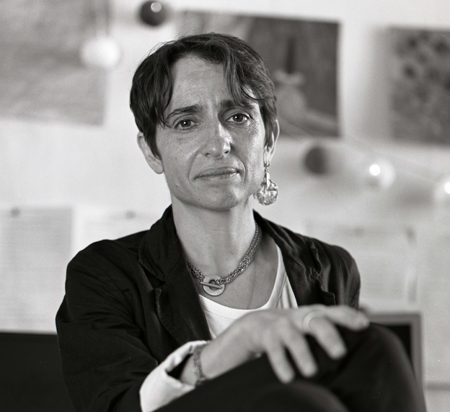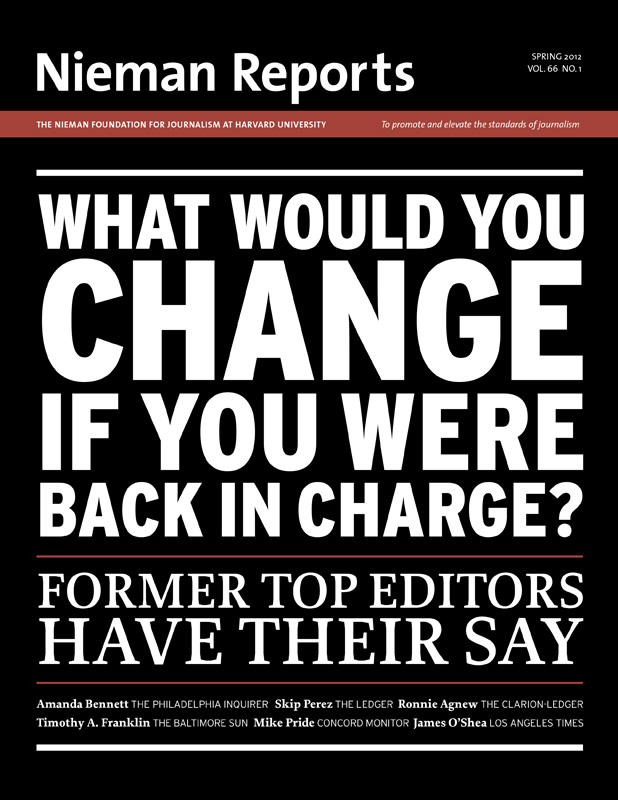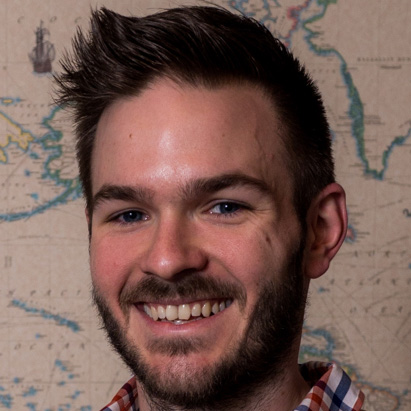
Masha Gessen’s new book is “The Man Without a Face.” Photo by Svenya Generalova.
Russian-born Masha Gessen is very much a journalist and a citizen. In writing “The Man Without a Face: The Unlikely Rise of Vladimir Putin,” released by Riverhead on March 1, she draws on the chilling history she has lived. “Putin changed the country fast,” she writes, “the changes were profound, and they took easily.” For more than 12 years, she didn’t vote in parliamentary elections because Putin had rendered them meaningless. Last year, her hopes for a regime change revived, she helped organize anti-government protests. Gessen spoke with Nieman Reports’s Jonathan Seitz over Skype from her home in Moscow. Edited excerpts of their conversation follow:
Jonathan Seitz: One way of reading “The Man Without a Face” is as a long-form fact-checking exercise. In untangling these conspiracies about who Putin might have ordered attacked or killed, how do you decide who to believe?
Masha Gessen: What I hope comes across in the book is that in a way it doesn’t matter. The blame for the situation—for a country where people run the very real risk of falling outside of the law, having no protection, and being killed—lies with Putin and the system he has built. The question of whether the order to have somebody eliminated came directly from him or whether it didn’t becomes secondary, right?
Yet I find it important to show where we can point to Putin personally [as the culprit] with some probability. So we end up with [former FSB agent Alexander] Litvinenko’s murder as the only one where—even without having a court decision or an investigation that has been open to the public—the evidence seems to point to Putin beyond any doubt.
Is the truth about these crimes ever going to be known?
I hope so. That is obviously one of the most frustrating things not only about writing a book like this, but also about living in this country. It’s a closed system that’s not particularly likely to document its violence, and if there’s a peaceful transition it will probably include immunity from prosecution.
So do you see Putin as just another power-hungry tyrant?
I think that’s basically right. One thing that is very important and has been underreported in the West is this incredible, insatiable greed that has been the motivating factor behind his decisions. If his first term as president was about consolidating power, then the subsequent eight years have been about consolidating wealth.
Do you also see Putin as something of a psychopath?
My researcher’s working theory was that Putin is a psychopath, but I’m not in the business of making psychiatric diagnoses, especially of people I have actually never met. But I think it’s as good an explanation as any.
What kind of response to your book are you expecting in Russia?
Things are changing fast so I feel a lot safer now than I did before the protests started. The original plan was for my family and I to leave the country just before the book came out. But I decided not to.
As someone who’s reported in Russia for 20 years, what lessons do you have for journalists covering your country?
I think that one lesson for any journalist working in a closed authoritarian society like Russia is that it’s a little bit like a war zone. I have been a war reporter and I believe deeply that you have to get out every couple weeks just to make sure that you don’t start taking unnecessary risks.
I also fully believe in activist journalism, so I am not speaking the standard objectivity line. But I think that if you do choose sides as a journalist, you have to make a conscious choice and not have it be a psychological trick.
You criticize the U.S. media for underreporting Putin’s rise to power and the way he rolled back reforms. How can American journalists do a better job covering Russia?
One thing I realized after finishing the manuscript is that American journalists are still behind the curve on Russia because they have not covered the incredible extent of corruption and the consolidation of wealth by the Kremlin. That is a very, very important failure because I am convinced that it’s what is principally motivating the protests now. I think American journalists are not doing a great job of explaining to their readers why thousands of people are coming out into the streets.
I think part of the problem is the reliance on pundits who shift positions much faster than they would in a more stable society. In Russia people who had no connections with the Kremlin—and were perceived rightly as independent commentators—fall into bed with the Kremlin and continue to be perceived by the U.S. press as independent commentators for years. Another problem is that a lot of people in the U.S. press who end up editing stories from Russia once served as Russian bureau chiefs. They think they understand Russia, but they don’t realize how the country has changed cardinally in just two, three or four years.
Do you see social media in Russia as merely an organizing tool or is it by nature an instrument of change?
That’s the big question of our age, I guess. I wouldn’t say that I was caught completely unaware by the protests, but I had no idea that Facebook and other social media were going to become such effective instruments so fast. Yet about half the people who attended the big protest on December 24 didn’t get their information from social media.
For many years, social media in Russia reflected the very unhealthy nature of the flow of information in Russia, where the blogosphere was as atomized as society itself. Offline, people didn’t have connections from one social stratum to another. It was the same way in social media. That still holds true to a large extent. Even Vkontakte, a Russian equivalent of Facebook, has almost no connection with Facebook. They are two completely unconnected social networks that have a similar interface, are used for similar purposes, but by two completely different groups of people.
You seem very hopeful about regime change.
I don’t think it’s possible to predict the exact mechanism of change because it’s such a broken society. But I do believe that once a system like this—which is so rigid that it’s inherently fragile—is destabilized, it cannot hold on for very long. It may be a matter of months. It may be a couple years, but it’s going to collapse. It just lacks the flexibility that is necessary for long-term survival. And I can say that I hope it will happen sooner rather than later.
Masha Gessen, a 2004 Nieman Fellow, is the editor of Vokrug Sveta science magazine and editor in chief of its publication house.




